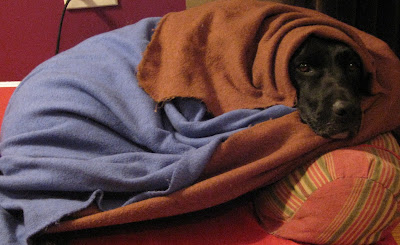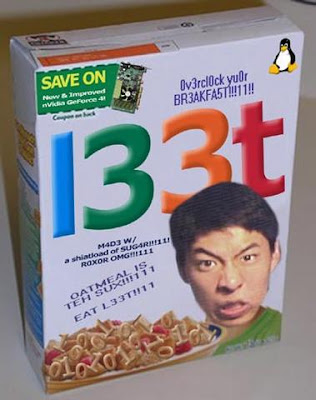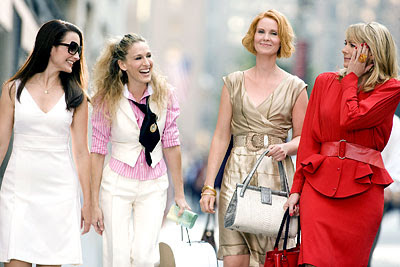 (There are no spoilers in this write-up)
(There are no spoilers in this write-up)While I was in New Zealand, a group of fellow travelers recommended the
His Dark Materials series to me after learning about my love for
The Lord of the Rings. I read all three books in the
HDM trilogy earlier this year--
The Golden Compass being the first.
While I thought the
HDM books were decent, they are in no way comparable to
LOTR, so I was almost offended at the comparison after having finished the trilogy. That being said,
incredible concepts are explored in
The Golden Compass, The Subtle Knife and
The Amber Spyglass, and they're worth reading for that reason alone. These books make you
think much more than the
LOTR trilogy does. And while the
His Dark Materials set is found in the Children's section of the book store and most of the main characters are kids, I strongly feel that these are books for adults.
It's not spoiling anything to say that there has been a great controversy brewing over the release of the movie because the books are deemed by several religious groups to be against religion or anti-God.

I think all of that drama is hilarious, because anyone who's read the books and then actually
thought about their message for more than 2 seconds will know that the books are definitely NOT anti-religion. They are "anti- organized- religions- that- abuse- their- power," which would seem to be a sentiment that the vast majority of people would/should agree with. The author is warning people about the consequences of
any one organization having too much authority, and is at the same time advocating free will. The organization in the book just so happens to be "the Church," but it could just as easily have been "the Government," in my opinion. When I first read it, I did not know about this aspect of the story and admit that I was a bit shocked that "the bad guys" all seemed to be angels and figures from the church and whatnot (more so because I knew it's widely thought of as a
children's book and I thought the concepts were really sophisticated), but once I took some time to think through what was going on rather than having a knee-jerk reaction and running with it, I was more comfortable with everything.
What annoys me about the people protesting this movie is that 1) they probably haven't read the books or seen the movies themselves, they're just jumping on the bandwagon, and 2) even if they have read the book/seen the movie, they are simply not giving readers, and kids in particular, enough credit. I give huge props to the U.S. Conference of Catholic Bishops for endorsing the movie and applauding it for what it is: "an exciting adventure story with a traditional struggle between good and evil" (and no, I'm not Catholic). My belief is that reading
The Golden Compass isn't going to turn kids away from religion any more than
Harry Potter or
Star Wars did (those franchises sparked the same concerns, remember!). The ironic thing is that the groups protesting this movie are proving the very point it makes--that it is dangerous and insulting when a religious group assumes it "knows better" than everyone else and doesn't think its members or the general public can make up their own minds.

After watching this movie, I'm pretty sure that the only two things any kids who see it are going to be thinking about afterward are 1) what their
daemon would be (in an imaginary world, mind you) and 2) how cool the polar bear fight was. They're not going to be like, "Sign me up, Satan!!!!"
And if there is anything a child would be scared of in this movie, it is Nicole Kidman's forehead.
"Mommy, why doesn't it move?" Good luck answering
that one, all you parents! Seriously though, the twelve-year-old in the movie had more facial expressions--I couldn't believe it.
Back to the controversy--as has been widely reported, the movie stripped out many references to "the Church"--but I thought the allusions they left in were still pretty obvious (to the adult audience). And I think that's OK--it would've been really lame if they tried to drastically change the entire plot. The other huge difference between the book and the movie is the ending. No, I won't spoil it, but for a very obvious reason the movie cut the storyline off a bit earlier than the book did so as to end on a happy note. Anyone who has read the book will know what scene they most likely are leaving for the second movie.

If there IS a second movie, that is. It
hasn't done so well at the box office!
Watching the film, I found myself thinking, "If I didn't read this book I would be really confused right now!" However, my husband never read the book and said that he could follow the plot just fine. What can I say? I'm slow. I was surprised that he said he liked it overall. "It was better than that
Narnia movie," was his exact quote.
I was disappointed with the movie simply because I thought the story line seemed choppy and some of the special effects looked fake (Lyra riding Iorek and some of the animals talking). But other effects looked very good (the daemons changing shape). And everyone knows I just don't like Nicole Kidman. Daniel Craig was fine, but he was hardly in it. The saving grace of this movie is the main character, Lyra, played by Dakota Blue Richards. She was cast perfectly and did an excellent job.
If you liked the book, then you should see the movie. If you didn't read the book, you should see the movie if you liked "that
Narnia movie." But if you are scared of extremely Botoxed foreheads, steer clear!
- e
P.S. There were some excellent trailers in front of the movie which I will discuss tomorrow.
 Happy New Year's Eve, everyone! This is going to be a short post as I returned from my holiday travels last night and am now frantically trying to clean my condo before guests arrive this evening to count down to 2008 with us.
Happy New Year's Eve, everyone! This is going to be a short post as I returned from my holiday travels last night and am now frantically trying to clean my condo before guests arrive this evening to count down to 2008 with us. Luckily, the church service was pretty laid-back and many people kept their coats on for the entire hour, even when going up to Communion. So that's what I did--and then high-tailed it to the mall to buy some extra clothes for the duration of our stay.
Luckily, the church service was pretty laid-back and many people kept their coats on for the entire hour, even when going up to Communion. So that's what I did--and then high-tailed it to the mall to buy some extra clothes for the duration of our stay.











































